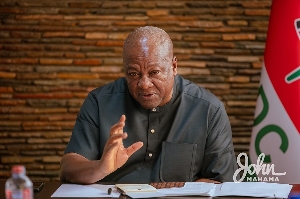Business News of Friday, 30 June 2017
Source: thebftonline.com
More cuts to import duties coming
Government has indicated that there will be more cuts to import duties and levies in order to reduce the cost of imported raw materials to boost local production.
Anthony Dzadzra, Director of Revenue Policy Division at the Ministry of Finance (MoF), said: "We need to reduce the cost of importation. Already we are looking at reducing the import taxes on raw materials for production," he said.
"We have so many raw materials and we are working on this with the Association of Ghana Industries (AGI) to reduce the import duties on selected raw materials so they can produce more and pay the right taxes," he added.
Government, in 2017, reduced some levies, taxes and import duties to the tune of GH¢1billion. This followed the amendment of some tax laws which saw the abolishing of nine tax lines and a reduction in the rate of three others.
Despite the large cuts and reductions, Mr. Dzadzra, has assured that more cuts and reductions should be expected, especially in import duties since government is looking at reducing the percentage customs duty contribute to revenue.
"We are looking at reducing the ratio that customs duty adds to the total revenue of the Ghana Revenue Authority (GRA). Currently we at 40 percent of GRA's revenue and we are working hard on reducing it 20 percent in the short term and bringing it down to as much as 5 percent," he added.
Speaking at a the presentation of a United States Agency for International Development (USAID) Trade Facilitation Project research findings on impact of trade-related fees and charges in Ghana, Mr. Dzadzra explained that while government is trying to reduce revenue, it is at the same time checking the efficiency of other income sources.
"In Ghana, we have domestic taxes including income and indirect taxes and customs. While we improve efficiency in domestic then we can be reducing the customs. The balance is very important if not we cannot pay salaries.
That is why the reduction in the customs duty and other import levies are a little long-term because you cannot just come in and remove all taxes. You need revenue to run your country including paying civil servants. The aim is to reduce import duty and implement efficiently the domestic taxes," he added.
The study on the impact of trade-related fees and charges dubbed "The Cost of Trading in Ghana", was conducted on behalf of the National Trade Facilitation Committee by the USAID and launched by the US Ambassador to Ghana, Robert Jackson at a programme organised by the American Chamber of Commerce.
The study details how official and unofficial fees and charges associated with trade impact Ghana's trade volume, government revenues, and private sector viability. The study is part of Ghana's efforts to comply with benchmark guidelines outlined in the World Trade Organisations Trade Facilitation Agreement.
The Trade Facilitation Agreement, which came into effect on February 22, contains provisions for expediting the movement, release and clearance of goods. It also sets out measures for effective cooperation between customs and other appropriate authorities on trade facilitation and customs compliance issues.
Mr. Jackson stressed that adoption of the study's recommendations and implementation of the Trade Facilitation Agreement would foster increased economic growth in Ghana.
"Ghana has tremendous potential to be the "trade gateway of Africa's. The United States will work with you to create an enabling business environment that builds on your economic and political stability and creates jobs for the citizens of both our countries," he added.











